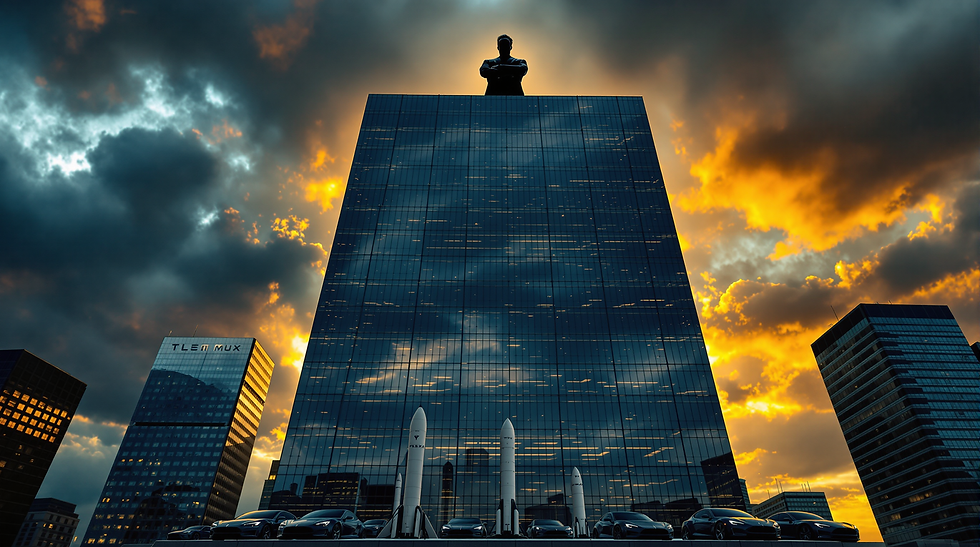Leon is A Megalomaniac
- Dylan Walker
- Jan 9
- 4 min read

Elon Musk's every word reaches 210 million followers and influences 619 million monthly active users on X (formerly Twitter). His actions represent one of the most striking examples of megalomania in modern history.
Musk's recent behavior has raised alarm bells about a megalomaniac's effect on global politics. His controversial moves range from accusing UK political figures of serious crimes to reportedly offering £100 million ($127 million) to support far-right political movements. These actions showcase textbook megalomaniac behavior. His self-proclaimed role as a "free speech absolutist" combined with his unprecedented influence over international political discourse has sparked significant debates. People question the concentration of power in tech billionaires' hands.
This analysis will get into Musk's behavioral patterns, political interventions, and growing influence that reflect a troubling shift in modern power dynamics.
Understanding Megalomaniac Behavior
The original understanding of megalomania shows a psychological pattern. This pattern includes an unreasonable belief in one's own superiority and an obsessive need for power [1]. Mental health professionals see that people with megalomaniac tendencies show delusions of grandeur. These people have an overwhelming desire to control others.
Research shows that megalomaniacs typically show these distinctive characteristics:
An exaggerated sense of self-importance and uniqueness
A preoccupation with unlimited success and power
A belief that they can only be understood by other "special" people
An expectation of constant admiration and special treatment
A tendency to exploit relationships for personal gain
The sort of thing I love about a megalomaniac's profile is their complete lack of empathy combined with an intense drive for dominance [2]. These people often have trouble sleeping because of high levels of nervous excitement. They tend to isolate themselves from those they see as inferior [2].
Megalomaniac behavior patterns become especially dangerous in positions of power. Studies reveal that megalomaniacs prefer to spend time with people of lower intellectual levels. They believe these individuals will accept their demands without question [2]. On top of that, they show intense hyperawareness of others' reactions while refusing to acknowledge their own mistakes [2].
These behavioral patterns help us spot potential megalomaniac examples in leadership positions of all types, especially when you have individuals who demonstrate an obsessive need for control and dismiss others' needs or feelings [1].
Analyzing Musk's Pattern of Control
Recent events reveal a clear pattern of control emerging from Musk's ownership of X. In fact, his influence now reaches way beyond the reach and influence of platform management into direct political interventions in multiple continents.
His actions show several concerning behaviors:
Musk's pattern of control has sections that use inflammatory language on X. He refers to politicians as "stupid cretin" and "sniveling cowards" [3]. His posts have gained unprecedented visibility, with engagement on his content increasing by 138% in views and 238% in retweets [4].
European leaders have reacted strongly to this behavior. French President Emmanuel Macron voiced alarm over unchecked power in tech billionaires' hands [3]. This highlights a megalomaniac's potential effect on democratic institutions.
Our analysis shows Musk's economic ties to various countries create complex power dynamics. Tesla makes half of its cars and gets nearly a third of its sales from China [3]. These business interests, combined with his political interventions, stand out as one of the most striking examples of megalomania in modern corporate leadership.
His actions come with measurable consequences - Tesla's registrations dropped 44% in Germany [3]. This suggests his political statements might be hurting his business interests.
The Tech Billionaire God Complex
The broader digital world of Silicon Valley shows a troubling pattern. Tech billionaires show signs of a megalomaniac god complex more than ever before. Silicon Valley's prophets have positioned themselves as modern-day saviors to take control.
These tech titans have amassed wealth beyond imagination and now show worrying behaviors:
Google Venture fund puts 36% of its $2 billion portfolio into life sciences startups that research immortality [5]
Jeff Bezos's plans include apocalypse bunkers and space colonies with a vision to house trillions of people on the moon [6]
Their plans extend to merging human consciousness with artificial intelligence [6]
This god-like positioning has serious ground implications. PayPal's co-founder Peter Thiel openly states he wants to live forever. Most people either accept or deny death, but Thiel prefers to "fight it" [6].
Today's Silicon Valley culture represents one of modern history's most striking examples of megalomania. The contrast is stark. William Hewlett and David Packard's generation invested in schools and hospitals. Modern tech leaders dream of altering humanity's future [5].
A fundamental disconnect exists between rapid technological progress and society's development. Technology evolves faster than society can adapt to these changes [7]. This gap grows wider each day.
Conclusion
Our detailed analysis shows Elon Musk's actions reveal a dangerous mix of unchecked power, tech influence, and megalomaniac tendencies. His behavior and unprecedented control over global conversations through X shows classic megalomaniac traits that go beyond regular corporate leadership.
Tech billionaires now see themselves as humanity's saviors. This troubling pattern becomes clear through their god-like ambitions. They invest heavily in immortality research and space colonization, which raises serious questions about their concentrated power.
The evidence clearly points to these megalomaniac tendencies that create most important risks to democratic institutions and social stability. Tech leaders chase their grand dreams of reshaping humanity while our society doesn't deal very well with putting proper limits on their growing influence.
The lessons from Musk's case are a vital warning about letting people with obvious megalomaniac traits gather too much power and influence. Our society should stay alert and just need better accountability from these self-proclaimed tech prophets who control our digital future.
References
[1] - https://www.sciencedirect.com/topics/medicine-and-dentistry/megalomania[2] - https://www.powerofpositivity.com/megalomaniac-behaviors/[3] - https://www.pbs.org/newshour/politics/elon-musk-helped-trump-win-and-is-now-looking-at-europe-many-politicians-there-are-alarmed[4] - https://www.the-independent.com/tech/elon-musk-trump-x-algorithm-bias-b2640976.html[5] - https://www.gsb.stanford.edu/insights/why-investors-throw-money-eccentric-ceos[6] - https://www.newstatesman.com/long-reads/2015/06/who-owns-future-how-prophets-silicon-valley-took-control[7] - https://www.pewresearch.org/internet/2020/06/30/tech-causes-more-problems-than-it-solves/



Comments